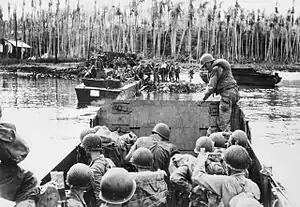Battle of Arawe order of battle
This is an order of battle listing the Allied and Japanese forces involved in the Battle of Arawe from 15 December 1943 to 24 February 1944.

United States landing craft and soldiers approach the beach at Arawe
Allies
Ground forces
- Director Task Force[1]
- 112th Cavalry Regimental Combat Team
- 112th Cavalry Regiment
- 148th Field Artillery Battalion (12 x 105mm M2A1 howitzers)
- 59th Engineer Company (Combat)
- 236th Antiaircraft Artillery Battalion (Searchlight) less elements
- two batteries of the 470th Antiaircraft Artillery Battalion (Automatic Weapons)
- A Company, 1st Amphibious Tractor Battalion USMC
- detachment, 26th Quartermaster War Dog Platoon.
- B Company, 1st Tank Battalion USMC (arrived 12 January)[2]
- Engineer, medical, ordnance and other support units[3]
- 2nd Battalion, 158th Infantry Regiment (force reserve)
- 112th Cavalry Regimental Combat Team
Naval forces
- Task Force 74.1 (covering force)
- Rear Admiral Victor Crutchley
- Cruisers
- HMAS Australia (flagship)
- HMAS Shropshire
- Destroyers
- Task Force 76
- Destroyers[6]
- Transport group[6]
- USS Humphreys[7]
- USS Sands[7]
- HMAS Westralia
- USS Carter Hall
- two patrol craft
- two submarine chasers
- Service group[6]
- Elements, Boat Battalion, 592nd Engineer Boat and Short Regiment, 2nd Engineer Special Brigade (17 x LCVP, 9 x LCM, 2 rocket-firing DUKWs, 1 x repair and salvage boat)[8][9]
- Beach Party Number 1[10]
Japan
Ground forces
- Merkus Garrison (withdrew after the Allied landing)
- Two provisional companies drawn from the 51st Division.[11]
- Komori Force
Naval forces
- Southeast Area Fleet / 25th Air Flotilla (sub-unit of 11th Air Fleet)
- 201 Air Group (Lakunai Airfield, Rabaul)[15]
- 204 Air Group (Lakunai)[15]
- 253 Air Group (Tobera Airfield, Rabaul)[16]
- 2nd Air Flotilla (sub-unit of 1st Air Fleet)
Notes
- Rottman (2009), p. 24
- Shaw and Kane (1963), p. 392
- Miller (1959), p. 277
- Miller (1959), p. 288
- Miller (1959), p. 289
- Gill (1968), p. 338
- Morison (1958), p. 374
- Miller (1959), p. 283–284
- Shaw and Kane (1963), p. 336
- Barbey (1969), pp. 103–104
- Shaw and Kane (1963), pp. 339–340
- Shaw and Kane (1963), pp. 327–328 and 343
- Miller (1959), p. 280
- Shaw and Kane (1963), p. 391
- Hata (2011), p. 65
- Hata (2011), p. 66
- Hata (2011), pp. 66–68
- Hata (2011), p. 68
References
- Barbey, Daniel E. (1969). MacArthur's Amphibious Navy: Seventh Amphibious Force Operations 1943–1945. Annapolis: United States Naval Institute.
- Craven, Wesley Frank; James Lea Cate. "Vol. IV, The Pacific: Guadalcanal to Saipan, August 1942 to July 1944". The Army Air Forces in World War II. US Office of Air Force History.
- Gill, G. Hermon (1968). Royal Australian Navy 1942–1945. Australia in the War of 1939–1945. Series 2 – Navy. Canberra: Australian War Memorial.
- Hata, Ikuhiko; Yasuho Izawa; Christopher Shores (2011). Japanese Naval Air Force Fighter Units and Their Aces, 1932–1945. London: Grub Street. ISBN 978-1-906502-84-3.
- Odgers, George (1968). Air War Against Japan 1943–1945. Australia in the War of 1939–1945. Series 3 – Air (reprint ed.). Canberra: Australian War Memorial.
- Morison, Samuel Eliot (1958). Breaking the Bismarcks Barrier, vol. 6 of History of United States Naval Operations in World War II. Castle Books. ISBN 0-7858-1307-1.
- Miller, John Jr. (1959). "CARTWHEEL: The Reduction of Rabaul". United States Army in World War II: The War in the Pacific. Office of the Chief of Military History, US Department of the Army. Retrieved 20 October 2006.
- Rottman, Gordon (2002a). U.S. Marine Corps World War II Order of Battle : Ground and Air Units in the Pacific War, 1939–1945. Westport: Greenwood Press. ISBN 0-313-31906-5.
- Rottman, Gordon (2005). US Special Warfare Units in the Pacific Theatre 1941–45. Battle Orders. Botley: Osprey. ISBN 1-84176-707-7.
- Rottman, Gordon (2009). World War II US Cavalry Units. Pacific Theater. Botley: Ospery Publishing. ISBN 978-1-84603-451-0.
- Shaw, Henry I.; Douglas T. Kane (1963). "Volume II: Isolation of Rabaul". History of US Marine Corps Operations in World War II. Archived from the original on 20 November 2006. Retrieved 18 October 2006.
This article is issued from Wikipedia. The text is licensed under Creative Commons - Attribution - Sharealike. Additional terms may apply for the media files.